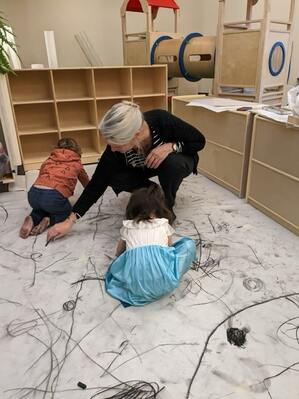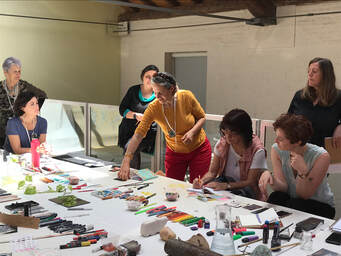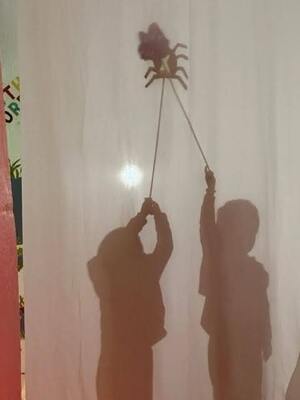What is The Collaborative Teachers' Institute?
What does it mean to study children's interests?
We believe that children's ideas, inquiries, and interests should always come first in the planning and implementing of classroom activities. For example, a group of children might express an interest in trains, building blocks, how the water fountain works or making music. Teachers could then encourage the children to pursue their interests in different ways – through painting or drawing, building sculptures out of different materials, telling stories, listening to stories, or inviting adults to come to the class to build things. Teachers then document this work, so that they can later reflect on its meaning and consider ways to further encourage children to deepen their curiosity and exploration.
Research on early childhood teaching clearly demonstrates that children benefit when programs are based on their interests, but there is very little guidance for how to integrate this learning into the classroom. The CTI offers teachers the practical information, tools and support they need to put children’s interests first.
How does it work?
The CTI holds monthly structured meetings where teachers come together to reflect on their work with children, sharing their experiences and their documentation of children’s work. The meetings follow a structured protocol to help support learning and move from reflection to action and back to reflection again. More information about this can be found in our Documentation Protocol.
Why is this important?
The CTI helps teachers begin to think and act differently as a result of participation in collaborative meetings. The work is relevant, immediately applicable and easily integrated into a teacher’s daily work. Teachers who work with the CTI change their teaching practices to better reflect the interests of the children they teach.
The CTI also offers a unique opportunity for advanced educators who want to take their professional development to the next level and develop into pedagogical leaders within their own institutions. Fostering these "master" teachers enables the CTI to extend its impact beyond its own meetings and workshops and into the institutions and communities in which these master teachers work. These engaged and dedicated early childhood master teachers go on to mentor newer teachers, further broadening the reach of the Institute and its child-centered approach.
What is Pedagogical Leadership?
Pedagogical leaders guide teaching and learning in their schools. They keep the focus on the remarkable children in their midst and how teachers can learn from them when they carefully observe, listen, and study together. These leaders encourage other teachers to engage in activities and investigations that bring joy and new learning to their children and themselves.
Pedagogical leaders challenge their colleagues to see themselves as researchers in the teaching and learning process. In so doing, they raise the bar for early childhood education.
We believe that children's ideas, inquiries, and interests should always come first in the planning and implementing of classroom activities. For example, a group of children might express an interest in trains, building blocks, how the water fountain works or making music. Teachers could then encourage the children to pursue their interests in different ways – through painting or drawing, building sculptures out of different materials, telling stories, listening to stories, or inviting adults to come to the class to build things. Teachers then document this work, so that they can later reflect on its meaning and consider ways to further encourage children to deepen their curiosity and exploration.
Research on early childhood teaching clearly demonstrates that children benefit when programs are based on their interests, but there is very little guidance for how to integrate this learning into the classroom. The CTI offers teachers the practical information, tools and support they need to put children’s interests first.
How does it work?
The CTI holds monthly structured meetings where teachers come together to reflect on their work with children, sharing their experiences and their documentation of children’s work. The meetings follow a structured protocol to help support learning and move from reflection to action and back to reflection again. More information about this can be found in our Documentation Protocol.
Why is this important?
The CTI helps teachers begin to think and act differently as a result of participation in collaborative meetings. The work is relevant, immediately applicable and easily integrated into a teacher’s daily work. Teachers who work with the CTI change their teaching practices to better reflect the interests of the children they teach.
The CTI also offers a unique opportunity for advanced educators who want to take their professional development to the next level and develop into pedagogical leaders within their own institutions. Fostering these "master" teachers enables the CTI to extend its impact beyond its own meetings and workshops and into the institutions and communities in which these master teachers work. These engaged and dedicated early childhood master teachers go on to mentor newer teachers, further broadening the reach of the Institute and its child-centered approach.
What is Pedagogical Leadership?
Pedagogical leaders guide teaching and learning in their schools. They keep the focus on the remarkable children in their midst and how teachers can learn from them when they carefully observe, listen, and study together. These leaders encourage other teachers to engage in activities and investigations that bring joy and new learning to their children and themselves.
Pedagogical leaders challenge their colleagues to see themselves as researchers in the teaching and learning process. In so doing, they raise the bar for early childhood education.
Additional Resources
|
Online Resources
New Mexico Early Childhood Alliance
The statewide website offers a wealth of resources, including discounts on goods and services, administrative tools, supports for classroom teachers, human resource materials, and family outreach and education. New Mexico Reggio Emilia Exchange (NMREX) The New Mexico Reggio Emilia Exchange is a learning collaborative that promotes the rights and inherent abilities of ALL children, families, educators, and community members through a commitment to innovative educational approaches Opportunities Exchange A national organization dedicated to transforming the landscape of early childhood education and care through enhancing child development outcomes while ensuring fair compensation and supportive work environments for practitioners. Opportunity Santa Fe 'Birth to Career' CTI Video A video by Opportunity Santa Fe featuring CTI The North American Reggio Emilia Alliance (NAREA) NAREA bridges the gap between the educational ethos of Reggio Emilia, Italy, and professionals in the United States and Canada through collaborative knowledge exchange, community-oriented professional development, and direct engagement with experts from Reggio Emilia UNM Art Education UNM Art Education equips students to engage with diverse communities and navigate various environments by offering hands-on experience and instruction in culturally-relevant, culturally-responsive, and culturally-reciprocal pedagogies. |
Print Resources
Making Learning Visible Through Pedagogical Documentation by Dr. Carol Anne Wien
The Anatomy of a Documentation Panel Pedagogical Leadership by Anne Marie Coughlin and Lorrie Baird Learning to Document in Reggio-inspired Education by Carol Anne Wien Reggio Documentation Panel-Making Voices of Practitioners: a Dialogue with the Shadows Teacher Research in Reggio Emilia: Essence of a Dynamic, Evolving Role by Carolyn Pope Edwards and Lella Gandini Inviting Children into Project Work by Carolyn P. Edwards and Kay Springate Inquiry-Based Learning: Preparing Young Learners for the Demands of the 21st Century by Melissa Fine and Lindsey Desmond Making Your Environment “The Third Teacher” by Margie Carter The Pedagogy of Listening Engaging City Hall: Children as Citizens by Mara Krechevsky, Ben Mardell and Angela N. Romans Music is a Well Made Sound: From Listening to Composition by Elena Giacopini, Emanuela Paglia and Mara Davoli |


